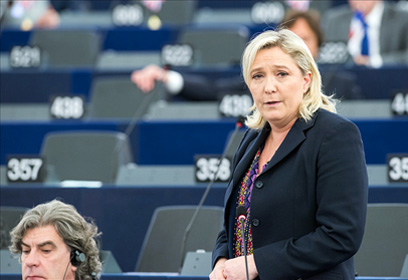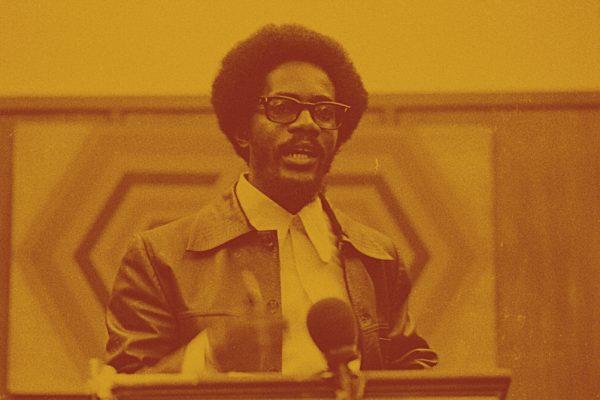It has been a difficult year for the French Republic. Terrorists struck Paris in January and again in November. After the second attack, a state of emergency was declared, police powers were expanded, hundreds of suspected terrorists were placed under house arrest, and France launched a bombing campaign against Islamic State strongholds in Syria. Capitalizing on the climate of fear, the extreme-right Front National (FN), led by Marine Le Pen, surged to new highs in national voting in March’s departmental elections, in which the FN took 25 percent of the vote. The party did even better in this month’s regional elections, taking some 28 percent, an all-time high, in the first round on December 6. Le Pen has long boasted that hers is “the leading party in France,” and she made good on that promise, garnering more first-round votes than any other party.
To a superficial observer, this litany of facts might suggest that a country unhinged by homegrown terrorist attacks is going fascist, that fear of a burgeoning enemy within has eliminated the barriers of decency that had kept the FN at bay for thirty years and opened the floodgates to a rising tide of xenophobia, Islamophobia, and racism. This reading seriously misrepresents reality, however, by suggesting that the malaise that has gripped France’s citizens is recent and fundamentally of racist origin and that their political response is so distinctive as to warrant the label “fascist.” Although none of these is true, the situation nevertheless warrants grave concern.
In the wake of the Great Recession, the technocrats’ EU dreams have acquired the musty odor of a faded utopia.
The malady that afflicts France is not new and is not primarily a consequence of terrorism or even racist resistance to immigration. It stems from one simple cause: growing numbers of French people feel that the nation’s ruling elite has no answers to the problems they face. Although it is of course true that people in many countries have lost confidence in their elites, the consequences are particularly serious in France, which has long relied to an unusual degree on elite governance. This is no accident. The Fifth Republic, established in 1958, sought to remedy the chronic instability that plagued the previous regime by vesting supreme power in an executive branch insulated from the rapidly shifting emotional undercurrents that roil democratic polities in troubled times.
Volatile legislative coalitions had been the Achilles’ heel of the Fourth Republic, so in the constitution of the Fifth the role of the legislature was reduced. Consequently, the route to political power runs less often through the legislature and more often through schools such as the Ecole Nationale d’Administration and the Institut d’Etudes Politiques (Sciences-Po), which are stepping stones to high-level staff positions in government. Running for office comes later, after the proper connections have been made and a position established in what the French like to call la classe politique—the relatively compact and isolated group of people in the know, which includes journalists, academics, and top-level technocrats as well as political officeholders.
The legitimacy of such a system depends on results more than on the ballot box.France’s well-trained and rhetorically polished officials earned the public’s confidence by achieving remarkable results—economic growth, improvements in health and housing, and infrastructure modernization—in the “Thirty Glorious” years after World War II and, to a lesser degree, in the thirty less glorious but not at all terrible years that followed. Over the last decade, however, faith in this elite’s ability to deliver on its promises has waned. Unemployment has remained stubbornly high. Young people, even educated ones, have had difficulty finding jobs in an economy that creates too few of them even though it the world’s sixth largest in terms of GDP and eighth most attractive destination for foreign direct investment.
In part, the French elite is a victim of its own success in building an ever-closer European Union. In the 1980s, the European Commission (EC), dominated by Jacques Delors and his largely French staff, took the crucial decisions to move Europe toward an ever-freer flow of capital, goods, and people and began the process of adopting the euro. In one respect these moves were defensive: Delors and his allies saw a large continental market as the best bulwark against the intensified competition of a global economy. They also saw a common currency as the best way to cement a reunified Germany into a regime of multilateral governance in which German economic might would be constrained and channeled by deft French diplomacy and technical expertise.
In the wake of the Great Recession that began in 2008, these pre-crisis calculations have acquired the musty odor of a faded utopia. Commentators now routinely and somewhat exaggeratedly speak of “German hegemony” in a Europe divided between a prosperous and disciplined north and a profligate and impoverished south. France falls uncomfortably on the dividing line between these two regions. On the one hand, it is plagued like its southern neighbors by persistent budget deficits and high unemployment. On the other, it is still largely unpunished by the bond markets owing to its efficiency in tax collection and steadfast refusal to break with Germany by declaring itself the leader of the anti-austerity bloc, as many who voted for Socialist President François Hollande in 2012 thought he had promised to do. In the most memorable speech of his campaign, Hollande proclaimed that his “enemy” was “the world of finance.” Since his election, however, he has hewed to the so-called Merkozy pact, whereby his predecessor, President Nicolas Sarkozy, accepted Chancellor Merkel’s insistence that austerity was the proper response to the economic crisis. President Hollande, in stark contrast to candidate Hollande, has refused to challenge that analysis while insisting that he will somehow still “invert the unemployment curve” before the end of his term without the stimulus many economists believe is necessary to achieve that goal.
The French elite thus bet heavily on the success of the EU and the euro, and it has paid a heavy price for that commitment since the crisis. The deficit reductions imposed by the EU have placed serious limits—or at any rate serious perceived limits—on the economic policy options available to both mainstream parties, Hollande’s Socialists and Sarkozy’s Les Républicains. Faced with the imperative to retrench, both experimented with formulas they hoped would spur growth without additional spending. Each chose from a severely restricted palette of options on the advice of eager technocrats convinced that bolder choices were not available. Sarkozy, borrowing from the American Republican playbook of George W. Bush, combined tax reductions for the wealthy with pension cuts; Hollande, borrowing from Sarkozy, former U.K. Prime Minister Tony Blair, and former German Chancellor Gerhard Schröder, favors supply-side reforms intended to reduce the cost of labor and pays for them with tax increases that fall heavily on the middle class.
These experiments with reform have their merits and demerits, which were discussed over the years in the conference rooms in Brussels, Paris, Frankfurt, and the other places where Europe’s invisible governors keep counsel with themselves. Those privy to the discussions of the innumerable working groups, interministerial committees, and EC directorates speak a common language and draw on a vast repertoire of conventional wisdom distilled from decades of experience in “light-touch” technocratic management of welfare-state economies led by politicians of various ideological stripes.
Most citizens, however, do not speak the language of the Euro-elite. They do not care about the technical arguments for and against the various “viable” policy options. Like democratic voters everywhere, they judge success and failure largely in relation to their personal situation. They are not concerned with how best to shore up the competitive position of European firms in a global economy or manage the ratio of workers to retirees in aging populations or generate the tax revenues necessary to fund the forward-looking research and development. If the legal age of retirement differs between neighboring states, what matters to voters is not the impact of this difference on unit labor costs and the balance of trade but whether they can retire at sixty or at sixty-seven. As long as the technocrats whose educations they financed with their taxes produced tolerably decent results, ordinary citizens did not question the legitimacy of a system whose internal discourse had so little in common with their daily concerns. But when the results became less tolerable and the reasons for them harder to understand, they opened their ears to the sirens of the far right.
Le Pen has proved remarkably adept at luring a voting public left adrift by the rule-bound rigidity and remoteness of the technocratic elite. She promised to assert French state power, as in past crises, by raising protective tariff barriers and throwing off the straitjacket of the euro, which prevents France from devaluing its currency in order to improve its competitive position. She had no compunctions about ignoring the probable negative consequences of these choices: capital flight, higher prices, isolation of France within Europe, and the possible collapse of the EU. This is transformational stuff for the FN, which had been known less as a policy shop than a factory of xenophobia. As Cécile Alduy has shown in her study of the FN’s rhetoric, the shift to economic themes allowed Jean-Marie Le Pen’s daughter to pirouette away from some of the hateful obsessions that had disqualified her father’s party in the eyes of many. Since her accession to the leadership, the younger Le Pen has “modernized” her party in other ways as well, making it friendlier to gays (even appointing a gay vice president) and more welcoming to the educated.
Le Pen’s party is outside government and thus less worrisome than, say, the GOP, captured by similar anti-elitist and anti-immigrant sentiments.
Yet, as Alduy also shows, the FN’s new leader has simultaneously zeroed in on widespread anxiety about the large Muslim presence in France, about 8 percent of total population. Political scientist Laurent Bouvet has pointed to the “cultural insecurity” resulting not only from the size of the Muslim population but also from incessant media coverage of refugees streaming into Europe from Syria and elsewhere. Terrorism has of course turned this insecurity into outright fear, and Le Pen did not hesitate to revert to more explicit anti-immigrant language in the wake of the November attacks. Her aggressiveness on the theme of reinstating tough border controls contributed to her strong showing in the first round of the regional elections, which took place only three weeks after the November attacks.
However, in the runoff held December 13, this tactic backfired, reminding many voters of the FN’s roots in bigotry. Between the first and second rounds, turnout increased by nearly 10 percent. This unusually strong response to the first-round results indicates that many voters unenthusiastic about the choices offered them were nevertheless dismayed by the idea that the FN had topped the polls in six of thirteen regions and seemed likely to take control of regional councils in at least three. In addition to the increase in turnout, the FN’s initial strength inspired a successful strategic response from the Socialists, who withdrew their candidates from two regions, one in which Le Pen herself led her party’s ticket and another in which her niece did. Hollande’s party thereby encouraged voters who had opted for the center-left in the first round to vote for the center-right in the second in order to bar the FN from power. In the end, the Front National won no regions.
Thus while many in France have lost confidence in their governing elite, it appears that substantial majorities still cannot abide the thought of turning the reins of government over to a party of the extreme right. Even with its recent surge, the FN has a long way to go to reach a majority, and under France’s two-round voting system, parties generally need to draw on support from people whose first allegiance belongs to others. This is a serious challenge for a party unacceptable to moderates, even those open to some of its proposed policies. The barrier holding the far right at bay is no longer as high as it once was, however, and further terrorist attacks or a deepening of Europe’s economic woes could open new breaches.
Nevertheless, the FN remains an “outsider” party in France, not a party of government. It is therefore less worrisome than, for instance, the U.S. Republican Party apparently captured by another populist insurgency fueled by similar anti-immigrant and anti-elitist sentiments. There are danger signs everywhere, and political elites around the world have been slow to respond. Leaders desperately clinging to the status quo hope that they can muddle through. Maybe they can. But if their hopes prove unfounded, if the center does not hold, the consequences will be devastating, as ugly social pathologies hidden during years of growth and prosperity resurface in an age profoundly disturbed by the continuing extension of global capitalism and the vast reshuffling of the world’s peoples.








